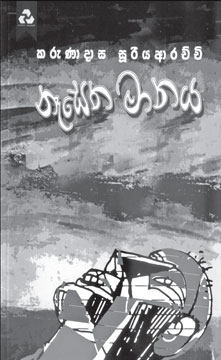A story beyond hearing
Nesena Manaya
Author: Karunadasa
Sooriaarachchi
A Dayawansa Jayakody publication
Reviewed by Daya Dissanayake
 Karunadasa Sooriaarachchi has released his new novel, Nesena Manaya.
When he published Mama Tawama Yami, last year we met a writer who is
still on his way, on a long journey. Karunadasa Sooriaarachchi has released his new novel, Nesena Manaya.
When he published Mama Tawama Yami, last year we met a writer who is
still on his way, on a long journey.
The new novel convinces us that he is moving ahead, one step at a
time. Each step is more than a milestone. It is a shady tree, where we
too can rest awhile, and listen to his story.
This time he is telling us a story that is beyond hearing. Yet, it is
a story within hearing too, which we cannot hear, or we do not want to
hear. Once again ‘Kasuri’ is insisting that we rest under his tree.
It is not a story we can listen to while on the run. Like his Ratu
Idda and Mama Tawama Yami, it is not a novel for us to read in a hurry,
or skip through. It is not a book for the mechanical reading of judges
for literary awards.
Then they will probably see only the story running on the surface. In
a mechanical reading what Kasuri is trying to tell us will just pass
through our mind.
Musty smell
Kasuri is a writer who has taken the maximum use of his experience
and exposure to all strata of our society, because he can empathise with
each and every person he had met in his life and even what he had heard
of other people.
Shyama becomes our own granddaughter, and we wait with Weerasekara
till she visits him at the Home for the Aged.
We also wait for Shyama with the tall, lean old man, waiting till the
van comes within earshot. The author makes us walk in the drenching rain
with Weerasekera, careful to keep to the middle of the lane, and we feel
the wet cowdung sticking to our toes, as Weerasekara stumbles over the
dung. We feel the musty smell of the dripping clothes and the stomach
revolting stale food.
Kasuri remainds us of things we have always known. There is a story
inside every empty arrack bottle.
A habitual drunk expects his wife to jump on him for coming home
drunk, but he is not able to face her silence, when she ignores him and
his drunkenness completely.
A major strength in Kasuri that we find again and again is his
dialogue, and the way his characters anticipate what another would say
or does not say, he is teasing us sometimes, disappointing us by making
his character leave unsaid, what was expected.
All through the story we find men enslaved by alcohol, who drink out
of habit, or who believe that by getting drunk would forget their
problems, or who want to talk to someone who would listen to them, and a
few who would come and drink alone and leave alone.
Funerals
Even though on the surface all these alcoholics seem to accept their
role and go on drinking, inside the story is the second story of the
wives and children, and how alcohol has ruined entire families.
Very subtly Kasuri tells us that there are no permanent drunkards,
that a man can give up drinking, if he really wants to.
Nesena Manaya is a story with many stories embedded in it, but each
story is of people we meet everyday, in the train, in the bus, in public
offices, at funerals and in Homes for the Aged. But not everyone could
write about them, bringing them into life within the pages, and between
the lines.
To be able to write about these people the author has to be able to
hear not only what is happening around him, but even out of earshot.
Our Sinhala novel has been progressing rapidly, and I would say we
have authors who are even well ahead of the Indian writers, that we know
of. We have authors who have the imagination to go beyond what is called
by some as the island mentality'.
We have authors who have the courage to experiment, to create new
stories, to create new ways of telling them, to give us something new
every time, than the standard novel, as viewed a century ago, with a
clear cut beginning, middle and ending, and then following such age old
rules.
Our minds are benumbed by the cheap teledramas shown day in and day
out on the idiot box, that we expect the same trash in the Sinhala
novels too.
But it is time to read novels such as Nesena Manaya, and re-read
Karunadasa Sooriaarachchi's previous novels, such as Ratu Idda and Mama
Tawama Yami, Batuwangala Rahula himi's Ranpata Chitrayaka Atin Gat
Mahalla and Naigalin Upan Puthrayo, also Kapila Kumara Kalinga's Piyasi
Kawuluwa to name a few. It is time we started appreciating the new
Sinhala novels. |


